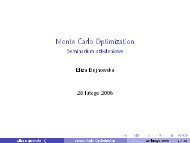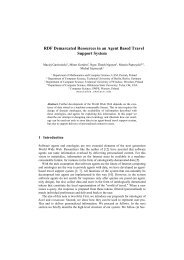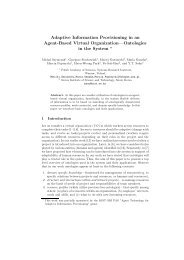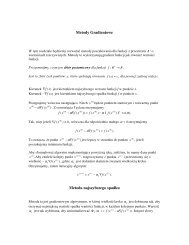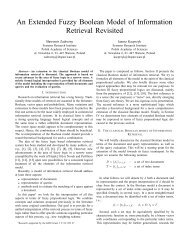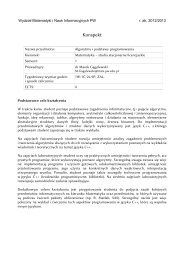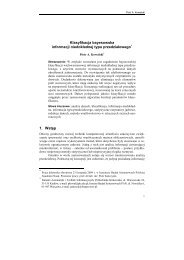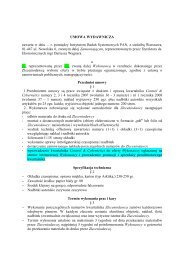<strong>Knowledge</strong> <strong>M<strong>an</strong>agement</strong> <strong>in</strong> <strong>an</strong> E-<strong>commerce</strong> <strong>System</strong> 12“<strong>Knowledge</strong> tr<strong>an</strong>sfer” is a view upon a view, <strong>an</strong> ontology of ontologies, which not only describes the existence of specificknowledge but also the knowledge that governs the <strong>in</strong>teraction between users of that knowledge. In this way knowledgetr<strong>an</strong>sfer overlooks the customer-supply ontology, the org<strong>an</strong>izational ontology <strong>an</strong>d others, as well as factors which aregenerally not considered when def<strong>in</strong><strong>in</strong>g knowledge entities / “stationary” perspectives on the system:- ch<strong>an</strong>nels <strong>an</strong>d mediums of knowledge tr<strong>an</strong>sfer (electronic),- possible barriers to knowledge exch<strong>an</strong>ge,- the guar<strong>an</strong>teed delivery of knowledge to the people <strong>an</strong>d / or components for whom it is <strong>in</strong>tended,- the dem<strong>an</strong>ds <strong>an</strong>d requests of knowledge entities with<strong>in</strong> the system, <strong>an</strong>d the acceptable <strong>an</strong>d appropriate parameters forknowledge tr<strong>an</strong>sfer,- maps of knowledge <strong>an</strong>d knowledge ch<strong>an</strong>nels as well as schedules for the flow of knowledge with<strong>in</strong> the system.Though it is one of the primary functions of knowledge m<strong>an</strong>agement, knowledge tr<strong>an</strong>sfer plays a role <strong>in</strong> the system unlikeknowledge creation or application, <strong>in</strong> that it is <strong>in</strong>tegrated with the system itself. In fact, the design of knowledge tr<strong>an</strong>sferis the design of the entire knowledge system, <strong>in</strong> which knowledge is created <strong>an</strong>d applied. Here we consider knowledgetr<strong>an</strong>sfer as a very high-level perspective on the knowledge <strong>in</strong> the system, a necessary set of relations for apply<strong>in</strong>g thelow-level knowledge <strong>in</strong> a coherent way but one that is not especially concerned with the content of that knowledge.6. KNOWLEDGE APPLICATIONF<strong>in</strong>ally there is the process of knowledge application with<strong>in</strong> the e-<strong>commerce</strong> environment. This process is the only onehere described that directly supports the goals of the system. The creation of knowledge <strong>an</strong>d the design of views upon itare the foundations for knowledge application. In order for this application to be successful (<strong>an</strong>d thus for the e-<strong>commerce</strong>system to succeed <strong>in</strong> the market), the system must have the right knowledge <strong>in</strong> the right form to apply it. As has beenpreviously established, <strong>an</strong>y given ontology with<strong>in</strong> the system may be reduced to its constituent knowledge; at its lowestlevel, this knowledge is a set of production rules which ultimate direct the actions of the system <strong>in</strong> respond<strong>in</strong>g to them<strong>an</strong>y different situations it will encounter <strong>in</strong> the market.Here we return aga<strong>in</strong> to the example of the user <strong>in</strong>terface. For purposes of <strong>an</strong>alysis, we start from the end product ofthe knowledge m<strong>an</strong>agement processes: the display of items to the user. Let us suppose the user prefers items shown <strong>in</strong> listform, with no thumbnails or other images but one-l<strong>in</strong>e descriptions; this preference only applies to one type of item, suchas co<strong>in</strong>s, a type which the user is not particularly <strong>in</strong>terested <strong>in</strong> the visual description above but prefers the <strong>in</strong>formation<strong>in</strong>tensiveform of a text list. How does the system know to do this, when the default is to use thumbnails to display theco<strong>in</strong>s, a few to a page?Let us consider the variety of knowledge sources necessary for this application <strong>an</strong>d thus a possible ontology forrelat<strong>in</strong>g them. To start, the user <strong>in</strong>terface component must have a basic knowledge of item types, <strong>in</strong>clud<strong>in</strong>g co<strong>in</strong>s. Theseitem types have different ways they may be displayed – some items may only be displayed <strong>in</strong> text, others with text <strong>an</strong>doptional images, images with optional text <strong>an</strong>d so on. In addition, the ontology must <strong>in</strong>clude/reference knowledge of themethods of display, which depend on the user’s me<strong>an</strong>s of brows<strong>in</strong>g the items (this is knowledge on the level ofimplementation). This leads to knowledge of the user’s situation – not only how they are brows<strong>in</strong>g the co<strong>in</strong>s, but alsowhat they w<strong>an</strong>t to see <strong>in</strong> brows<strong>in</strong>g them. This knowledge c<strong>an</strong> only be ga<strong>in</strong>ed from <strong>an</strong>alysis of user’s past behavior,particular <strong>in</strong> relation to co<strong>in</strong>s but also <strong>in</strong> other brows<strong>in</strong>g situations. If the user has never before looked at co<strong>in</strong>s, but hasalways chosen the text-only list format for display, then he will probably w<strong>an</strong>t to view list<strong>in</strong>gs of co<strong>in</strong> items <strong>in</strong> the samefashion (If… then = a knowledge statement, this one regard<strong>in</strong>g a correlation between previous brows<strong>in</strong>g habits <strong>an</strong>d achoice the system should make). To further complicate the situation, the order <strong>an</strong>d characteristics of the list should alsobe considered variable, subject to knowledge-produced system choices.It is obvious that the user <strong>in</strong>terface component must access a large subset of the system’s knowledge <strong>in</strong> order toarrive at the display of co<strong>in</strong>s <strong>in</strong> list format for this user. What is less obvious is how this actually occurs. The <strong>in</strong>terfacecomponent is <strong>in</strong> fact divided <strong>in</strong>to m<strong>an</strong>y different sub-components, each of which makes a particular sub-choice (such asthe order of the list) <strong>an</strong>d uses a sub-ontology to do this. The entire component (to identify it as more th<strong>an</strong> its low-levelInternational Conference on Electronic Commerce Research (ICECR-5)
<strong>Knowledge</strong> <strong>M<strong>an</strong>agement</strong> <strong>in</strong> <strong>an</strong> E-<strong>commerce</strong> <strong>System</strong> 13parts) need only consider the m<strong>an</strong>ipulation of these sub-components <strong>an</strong>d the ontology, which <strong>in</strong>cludes the generalconcepts of user <strong>in</strong>terfaces.This idea extends to the entire doma<strong>in</strong> of the e-<strong>commerce</strong> system. Very high-level ontologies, from the hum<strong>an</strong> or thecomponent/subsystem/functional role perspective, should safely be able to m<strong>an</strong>ipulate high-level ontologies withoutviolat<strong>in</strong>g the logical consistency of the constituent ontologies. This is very powerful <strong>in</strong> hum<strong>an</strong> h<strong>an</strong>ds, because it allows usto m<strong>an</strong>ipulate the knowledge of the system without remov<strong>in</strong>g ourselves from the low-level function<strong>in</strong>g of it.7. KNOWLEDGE MANAGEMENT BASED ADAPTIVITYOne of the more import<strong>an</strong>t themes that permeate this paper is the fact that knowledge m<strong>an</strong>agement is synonymous withch<strong>an</strong>ge: adaptation <strong>an</strong>d evolution. It is assumed that at the beg<strong>in</strong>n<strong>in</strong>g the system operates on pr<strong>in</strong>ciples extracted fromhum<strong>an</strong> experts that represent their view of the population of the potential customers. It also <strong>in</strong>corporates a number oftheoretical laws that have been proposed as high-level abstractions of the economic reality. One of these theories claimsthat it is almost impossible to build a correct model of <strong>commerce</strong> (<strong>an</strong>d therefore also e-<strong>commerce</strong>) reality based only ontheory <strong>an</strong>d knowledge extracted from hum<strong>an</strong> experts. The system has to be adjusted to the deal with real-life customers,who may behave differently th<strong>an</strong> the theory predicted. In addition, as the time goes by, clients’ <strong>in</strong>terests <strong>an</strong>d needs ch<strong>an</strong>gedue to their ag<strong>in</strong>g as well as due to the ch<strong>an</strong>ges <strong>in</strong> the environment (e.g. bell bottom je<strong>an</strong>s were popular once). To be ableto successfully work <strong>in</strong> the const<strong>an</strong>tly ch<strong>an</strong>g<strong>in</strong>g world, the system has to be adaptive. S<strong>in</strong>ce knowledge m<strong>an</strong>agement is aprocess of const<strong>an</strong>tly adjust<strong>in</strong>g knowledge through its application <strong>an</strong>d through collection of additional data <strong>an</strong>d extract<strong>in</strong>gknowledge from it <strong>an</strong>d <strong>in</strong>corporat<strong>in</strong>g it <strong>in</strong>to the system, with the goal to const<strong>an</strong>tly improve the exist<strong>in</strong>g model(s) ofreality <strong>an</strong>d effectiveness of the operation of the system, it is knowledge m<strong>an</strong>agement that is the basis for systemadaptivity.8. CONCLUDING REMARKSIn this paper we have <strong>an</strong>alyzed the knowledge m<strong>an</strong>agement aspects of <strong>an</strong> e-<strong>commerce</strong> system, through the <strong>in</strong>tegration ofknowledge functions with the realities <strong>an</strong>d potential capabilities of e-<strong>commerce</strong>. To achieve this goal we gave discussedthe three fundamental functions of knowledge m<strong>an</strong>agement: knowledge acquisition, tr<strong>an</strong>sfer <strong>an</strong>d applications <strong>an</strong>d showedhow these functions become the basis of e-<strong>commerce</strong> system adaptivity. We have offered a number of perspectives onthe knowledge <strong>in</strong> the system, as well as some possible positions from which this knowledge may be applied to bothsystem-side <strong>an</strong>d customer scenarios. Furthermore, these perspectives allow us to reconcile the m<strong>an</strong>y different views of e-<strong>commerce</strong> <strong>an</strong>d knowledge <strong>in</strong> e-<strong>commerce</strong>, on the level of hum<strong>an</strong> <strong>an</strong>alysis as well as that of implementation. Some ofthese views may be explicitly codified <strong>in</strong>to ontologies <strong>an</strong>d utilized <strong>in</strong> m<strong>an</strong>ipulat<strong>in</strong>g the knowledge <strong>an</strong>d knowledgefunctions <strong>in</strong> the system. These ontology-perspectives allow the same low-level knowledge, ga<strong>in</strong>ed from a variety ofsources (such as hum<strong>an</strong> experts, data m<strong>in</strong><strong>in</strong>g <strong>an</strong>d automatic learn<strong>in</strong>g) to be approached <strong>in</strong> such a way that the necessaryelements are related <strong>in</strong> a m<strong>an</strong>ner most useful for the task at h<strong>an</strong>d.The results of these theoretical <strong>in</strong>vestigations are currently be<strong>in</strong>g employed <strong>in</strong> the process of implement<strong>in</strong>g ademonstrator system for e-travel support. The proposed system will be based on software agents <strong>an</strong>d will follow thegeneral decomposition proposed <strong>in</strong> [1]. The knowledge m<strong>an</strong>agement processes described here <strong>an</strong>d <strong>in</strong> [24] will becomethe keystone of the system. We will report on the progress of this implementation <strong>in</strong> the near future.References[1] R. Angryk, V. Gal<strong>an</strong>t, M. Paprzycki <strong>an</strong>d M. Gordon. Travel Support <strong>System</strong> – <strong>an</strong> Agent-Based Framework. InH. R. Arabnia <strong>an</strong>d Y. Mun (eds.), Proceed<strong>in</strong>gs of the International Conference on Internet Comput<strong>in</strong>g (IC'02),CSREA Press, Las Vegas, NV, 2002, 719-725.International Conference on Electronic Commerce Research (ICECR-5)



